New York- Pakistan has called for greater international collaboration to address the global drug problem, emphasizing the need for political commitment and shared responsibility. The country underscored the critical role of the United Nations Office on Drugs and Crimes (UNODC) in helping member states combat drug-related crimes through a comprehensive approach, from controlling illicit cultivation to reducing demand.
These remarks were made by Ambassador Usman Jadoon, Pakistan’s Deputy Permanent Representative to the UN, during a side-event at the UN headquarters. The event, co-hosted by the Permanent Missions of Russia, China, Cuba, Egypt, Singapore, Pakistan, Uzbekistan, and UNODC, focused on a unified global strategy to tackle the drug issue.
Mr. Jadoon expressed Pakistan’s concerns regarding the drug crisis, highlighting its severe consequences on health, security, socioeconomic development, and overall well-being. He emphasized Pakistan’s commitment to a zero-tolerance policy as part of a comprehensive strategy to combat the illicit drug trade.
Despite challenges such as limited resources and technological constraints, Pakistan continues to play a leading role in curbing drug trafficking and abuse, particularly in addressing the spread of opiates and synthetic drugs from the region, he noted.
“Pakistan is steadfast in its efforts to protect society and the world from the devastating impact of illicit drugs. We will continue to work closely with the global community to combat this issue with unwavering determination,” Jadoon said.
He also outlined key components of Pakistan’s counter-narcotics efforts, including stringent controls on drug precursors, drug demand reduction campaigns, improved treatment and rehabilitation programs, and enhanced cooperation at bilateral, regional, and international levels. Additionally, Pakistan’s approach includes a gender-sensitive advocacy strategy.









